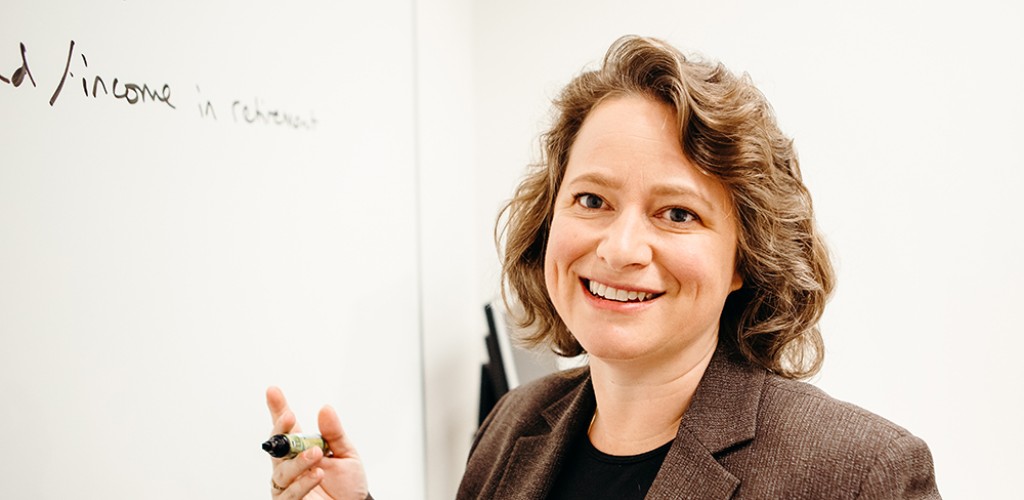Academic focus: Marketing, consumer behavior, behavioral economics and consumer financial decision making
Research summary:
I’m trained in the area of behavioral economics, and my research is on consumer judgment and decision making. Much of my work is on self-control problems and consumption timing decisions. For example, I’ve written papers on how people decide to consume special items like a saved bottle of wine or frequent flier miles. I also apply those ideas to financial decisions, such as how to have enough income during retirement.
I also do quite a bit of research on the topic of psychological ownership, or the feeling that an object is yours even if you don’t actually own it. For example, in a recent paper, we look at how increasing psychological ownership can lead to people taking better care of public resources like parks and lakes. Generally, I try to bring a lot of real-world ideas into both my research and my teaching.
What do you like to do when you’re not working?
I’m a bit of a homebody these days during the pandemic! I like spending time with my family, doing projects around the house, reading and drinking good wine.
What are your current outreach/extension projects?
For the past several years, I’ve been involved in work with policy and government organizations, based on my work on consumer financial decision making. I served as a visiting scholar at the Consumer Financial Protection Bureau from 2017-2019. We are still working together on the topic of how to design disclosure forms to help consumers make better financial decisions. I also work closely with the Social Security Administration, which funds my research on interventions to guide people through their retirement decisions.
What are three adjectives people might use to describe you?
Empathetic, conscientious, optimist
What brought you to Cornell CALS?
First of all, my husband and I are both Cornell alumnae, and returning to this campus is something we’ve long dreamed of doing. Second, the research area of behavioral economics, which I study, effectively originated here, and it’s exciting to be part of that history.
Finally, and most importantly, much of my research is on the applied side — I care deeply about doing research that has an impact on people’s lives. I love being at a place where I can contribute to making an impact on the challenges our society faces!
What do you think is important for people to understand about your field?
I think a lot of people perceive marketing as the study of convincing people to buy things they don’t need — most of our daily exposure to marketing is through advertising, and we don’t often get to see the deeper strategy behind it.
I look at marketing as the opportunity to connect people to the solutions that best meet their needs. That includes all types of needs, including making decisions both for everyday needs, like what to have for dinner, and for larger lifetime needs, like how to not run out of money during retirement. The focus is on understanding and helping consumers, rather than on what to sell to them.
Why did you feel inspired to pursue a career in this field?
My work is in the field of behavioral science and decision making. After finishing my bachelor’s and master’s degrees in electrical engineering, I never even knew there was a formal area of study in decision making until I wandered into a course on it during my first month of being an MBA student at the University of Chicago back in 1997. The course was being taught by Richard Thaler, who later won the 2018 Nobel Prize in economics for his research in behavioral science. I was immediately intrigued by the material and decided that it was what I wanted to study from that point forward.
What’s the most surprising thing you’ve discovered about Cornell and/or Ithaca so far?
When I was an undergraduate here, I think I was so busy studying that I didn’t go explore the local area as often as I should have! Since moving back to Ithaca, we’ve been getting out to some of the parks and trails and really enjoying the natural environment.
If you had unlimited grant funding, what major problem in your field would you want to solve?
The retirement decision, for modern Americans, is incredibly complex. Forty years ago, many retirees could just depend on monthly income from Social Security and a pension, and they did not need to figure out how to manage their own retirement wealth.
Today, people are expected to save for their own retirement and then figure out how to make that wealth last during the 30+ years after they stop working. I would like to help find ways to make these decisions easier for people so that they could comfortably enjoy their retirement instead of being worried about running out of money.





